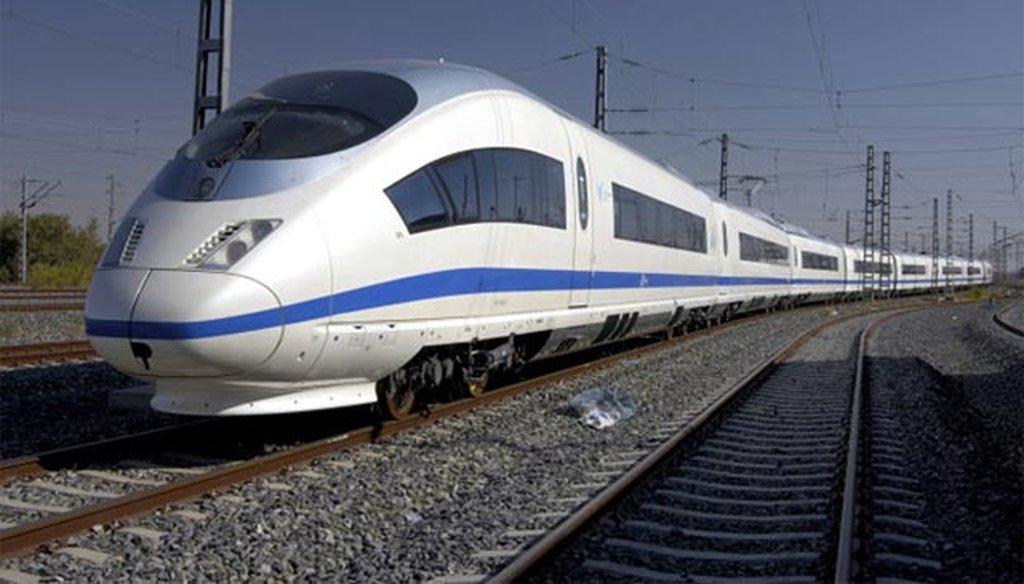Stand up for the facts!
Our only agenda is to publish the truth so you can be an informed participant in democracy.
We need your help.
I would like to contribute

Many people are fighting Florida Gov. Rick Scott to keep high-speed rail on track.
The fight over high-speed rail is rolling into its third week, and claims from both sides of the debate seem only to be intensifying.
At PolitiFact Florida, we've examined several of the major issues surrounding the proposed Tampa-to-Orlando line. On March 3, 2011, the case went before the Florida Supreme Court, where two state senators -- one Democrat and one Republican -- sued to try to keep the project alive.
At issue is $2.4 billion in federal funding being offered by President Barack Obama. Florida Gov. Rick Scott announced on Feb. 16 that he would reject federal funding for the rail project, saying he was worried that the state could be left on the hook for any construction cost overruns stemming from the $2.7 billion project, or that the state might have to pay back the federal government should the rail line fail.
While proponents of the line argue that's not the case, Scott has dug in his heels.
One reason he offered for rejecting the federal money -- what he said were overly optimistic ridership studies. Scott found it implausible that the Tampa-to-Orlando line could have 3.07 million riders annually, as he said was projected, by comparing it to Amtrak's Acela high-speed rail service in the northeast United States.
"It is projected that 3.07 million people will use the train annually," Scott said. "Keep in mind that Amtrak's Acela train in Washington, D.C., Boston, Philadelphia, New York and Baltimore only had 3.2 million riders in 2010. And that market population is eight times the size of Tampa-Orlando."
While his numbers were right, we ruled the comparison Half True, noting that he omitted a much bigger chunk of Amtrak's passengers who use Amtrak rail service between those major cities.
PolitiFact Florida also found fault in another rail comparison Scott's been making -- suggesting that the Tri-Rail commuter system in Palm Beach, Broward and Miami-Dade counties portends doom for the high-speed line. Experts told us that there's too much different between the two lines to make a valid comparison. The high-speed line would serve tourist and leisure travelers and charge higher ticket fares, while the commuter line serves workers and tries to keep costs low.
Robert Puentes, senior fellow and director of the Metropolitan Infrastructure Initiative at the Brookings Institution, said the comparison between Tri-Rail and high-speed rail is like comparing apples to oranges.
That was enough for us to rule that comparison Barely True.
On job creation figures, Scott did much better -- while a Democratic rail proponent overestimated the project's impact.
Scott, appearing on Fox News while visiting New York, said the jobs created by the Tampa-to-Orlando project would be "short-term jobs." That's Mostly True. In fact, more than 80 percent of all the jobs created by the project would be contained to two years of construction. After the train is up and running, it would employ 600 people permanently and create an additional 500 spinoff jobs, experts say.
U.S. Rep. Corrine Brown, D-Jacksonville, meanwhile, received a False rating for claiming the high-speed project would create 60,000 jobs -- a figure she spouted on the floor of the House of Representatives.
The state measures jobs created by the rail project in "job-years," which is a different calculation that, while valid, inflates the impact of the project. In reality, the most people working on the project at one time (including spinoff employment) would top out at 21,600 in 2012 -- the second year of construction.
We also looked at a Constitutional argument being made by state Sen. J.D. Alexander, who questioned whether Scott had the unilateral authority to nix the rail deal without consulting the Legislature (an argument made in the lawsuit against Scott). We ruled Alexander's position Half True, noting that while state statutes require Scott to spend money appropriated in the state budget, that the governor still holds most of the cards on whether the project ultimately proceeds.
Lastly, we dinged state Senate President Mike Haridopolos for siding with Scott's decision rejecting the high-speed rail money. Haridopolos previously had voted for legislation setting the high-speed project in motion, supported a budget that helped create the framework for the rail plan and, as recently as January, talked about making the high-speed project happen. He changed his tune after Scott's announcement, which to us rated a Full Flop on the Flip-O-Meter.
This probably isn't the end of the line for the high-speed rail debate, which means you can expect more fact checks to come soon.
Our Sources
See individual items.








































